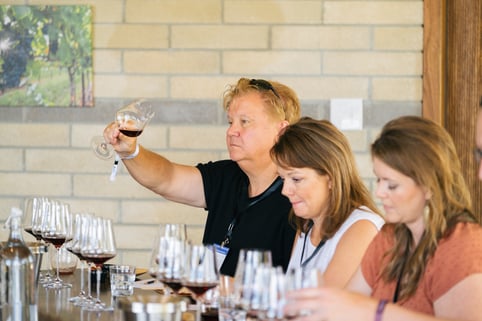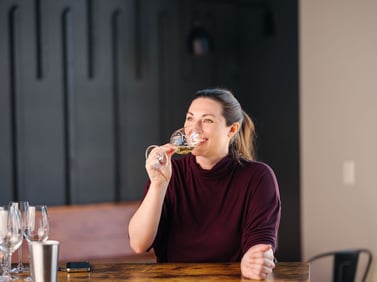Mindful Drinking
April 25, 2024
For those who are in-the-know, wine transcends being just an alcoholic beverage. Wine is history, food, chemistry, culture, and ultimately thought-provoking. Quick consumption, passive drinking, or settling for poor quality product passes this liquid past the point of inspiration and into obscurity. How do we slow down as the world speeds up? Can we transition drinking into tasting, or at least find the time for both? This article discusses methods to become a Mindful Drinker, where prioritizing tasting with a mind-palate connection is like building a muscle, and drinking is the past.

THE MIND'S WAY OF TASTING WINE
In my classes I ask what experience students have with wine and I often get the ole, "well, I drink a lot!" It is certainly possible to gain sensory skills through this kind of osmosis, but the skill of appreciating the subtleties of wine, for whatever purpose, includes much more than just taste buds.
Instead, the mind may be our most powerful tool for tasting, and the action of just drinking does't require activation of our mind. The question is, when do we desire to taste thoughtfully, and when are we making the choice to just enjoy a good drink? Luckily, for the person sourcing well-made wine, we recommend a regimen of both! After all, the history of wine appreciation has regularly defined a time for celebrating and drinking, and a separate prioritization of understanding the psychological nature of this classic fermented beverage.
Tasting, or mindful drinking, requires activation of the mind so that our sensory memory is tapped into. What we have tasted and smelled in our entire lives is a Rolodex to inform us on our environment - including the wine in our glass. Yet, there's a reason why a person can stick their nose in a glass, be told that aromas of strawberry are there, and not smell the strawberry. Our minds, powerful as they are, stored the memory of strawberries that we have had in our past, and has combined the smell, taste, feel, and sight together so that we can recall our experience with the fruit in detail. Pulling apart just what we know about strawberry smell without the same look, taste and feel of a fruit is, and should be, quite difficult. We haven't trained our minds to recognize strawberry as an alcoholic, non-sweet liquid made from grapes. Strong minds and strong memories might rebel against someone insisting that this juice can smell of cedar, flowers or pineapple. I would go as far as to diagnose some of my students with "aromatic rejection" - the mind's denial of certain aromatic association due to mismatched sensory components. "Smells like strawberry, but does not look or taste like strawberry = must not be strawberry." Unfortunately, this rejection happens too quickly to recognize or to prevent. In the moment we simply feel that we don't smell strawberry.
TIME TO WORK OUT
Strengthening the mind-palate connection to prevent this aromatic denial builds us a bridge for sensory recall, and it is only as strong as our work-out routine. Wine professionals and connoisseurs can exercise sensory recall just like training a muscle. It's important to have a regimen with several different types of exercises, and enough repetition to see results. Trust the process, exercise your mind-palate connection when it is the right time for mindful drinking, and make sure you give yourself time to see results! Here are the high-reward exercises to start off a strong tasting routine:
1. SLOW DOWN AT THE RIGHT TIME
Depending on your mindset and the company you're with, you may be more or less ready to exercise your tasting muscles. For instance, trying to taste after a long day at work may be less effective than tasting first thing in the morning when you are more fresh. Or, on a day off you may open a bottle of wine and perform a tasting by yourself before sitting down for dinner with your family. This could look different from person to person, but finding a time when your mind is focused on skill-building. Then, perform a full tasting that includes sight, nose, and palate assessments. There are public guides out there like from the Wine & Spirits Education Trust (WSET Level 2 in Wines Systematic Approach to Tasting Grid) and you can learn more about tasting technique at any class at the Hill Country Wine Academy.
2. POUR MORE OFTEN
Filling your glass too full means you've chosen drinking over tasting, or that you are attempting to taste but are making it more difficult on yourself. When we fill our glasses less we allow the aromas of the wine to fill more of the glass and we encourage the wine to keep changing as the liquid comes up in temperature gradually. Especially if you are enjoying a bottle with company, keep yourself more in touch with the wine by pouring less wine in your glass more often. Pro tip: Establish yourself as the designated "pourer" for your group!
3. ISOLATE YOUR SENSES
Start training your senses in isolation so that they don't rely on each other like they are meant to do. Smell a strawberry with your eyes closed while you picture wine, and even while holding an empty wine glass. This practice will train your sense of smell away from the rest of your senses. Then repeat. Recognizing aromas in wine will become progressively easier.
4. TASTE MORE OF WHAT YOU DON'T LIKE
Our minds like to pick up and recognize new information, and so constantly drinking and tasting wines we like means we may be dulling our tasting sense over time as the similar aromas of the wine becomes less and less new to us. Familiarity can be a danger to our progress! To keep your palate noticing new nuances in wine we must put newness in front of it, and often. This is similar to the concept that smelling coffee beans in a perfume shop with help to "reset" your sniffer. Keep your nose on its toes.
5. MAKE YOUR TASTING NOTEWORTHY
The way that we store information is connected to our emotions and how strong or notable they are. For instance, if you eat cherries passively one evening you may not be able to recall exactly what the experience was like. But, your very first cherry, or a cherry that you had at a particularly memorable occasion could be implanted in your brain strongly. When you want to build your sense of smell make sure you are active or excited! Play a game, hype yourself up, or go to a new place where the memory of the experience helps to strengthen the sensory memories you'll store.
Like any work-out it's important to have good form or else the strength-training goes to waste. Practice your skills with an instructor and then apply what you learn to the wines you interact with outside of class. To find the best way to tap into your palate, reach out to info@hcwineacademy.com or check out our short course collection below!
Santé!
Words By Kelsey Kramer
Director of Education
Hill Country Wine Academy
The Hill Country Wine Academy is a provider of wine certification courses, continuing education, and staff training. Get the most up-to-date information at www.hcwineacademy.com or via our monthly newsletter:

